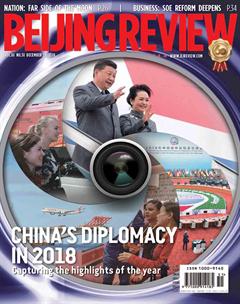Are Colleges Producing Too Many English Majors?

At the International Higher Education Forum 2018 held in November, Wu Yan, Director of the Department of Higher Education of the Ministry of Education, said majors that “do not live up to conscience” should be scrapped. He was referring to disciplines or majors that were producing more graduates than society needed or whose curriculums did not meet students actual needs.
Going by this yardstick, English is indisputably a major that does not “live up to conscience,” according to some critics. So far, of Chinas 1,448 undergraduate universities, over 1,000 have English as a major, mostly focusing on English literature. These colleges and universities have more than 600,000 students studying English. Apart from foreign language universities, teachers training colleges and comprehensive universities, even specialized institutions like agricultural, petrol, marine and medical colleges have set up English departments. Every year, Chinese colleges and universities churn out nearly 200,000 graduates with English as their major.
But a recent survey conducted in Shanghai shows that less than 5-percent English graduates continue studying the language or literature in postgraduate schools. Most graduates fi nd jobs related to fi nance, law, business management or other subjects that are not exclusive to people with an English education background.
Against this backdrop, some colleges and universities have already acted to scrap their English departments. Once pursued by so many students, today, the English major is losing clout in Chinas higher education. People have different opinions on why this discipline is going out of favor as well as suggestions on what to do to improve the situation.
Calls for reform
Cai Jigang (www.whb.cn): Despite the warning signs that English majors are facing rising difficulties in finding jobs in a related field, some colleges and universities still rush to set up English departments. They enroll a large number of undergraduates and postgraduates, turning a blind eye to the fact that there are not many suitable jobs for these students. They are more interested in the preservation of the discipline than in the actual demand for such students in the job market.
Actually, its not a difficult decision. Those who are far-sighted will do something to transform the current structure of the discipline. They will steer the English departments to areas such as medicine, engineering, petrol, forestry, aerospace and information technology to produce interdisciplinary talents. Educators must get rid of their misconception that English is by nature a humanities subject. Instead, they should see it as an instrument that students can use to acquire sci-tech, economic and legal knowledge.
Its a pity that some universities that boast excellent specialties choose to focus on the language itself instead of combining their other specialties with English. Just to set up and retain this discipline, they bring in teachers and professors in linguistics and Western literature but fail to pay suffi cient attention to the career prospects of their students.
Only a small number of colleges should continue with their traditional practice of researching English linguistics, literature and similar things. Most colleges should either scrap their English departments or switch to producing interdisciplinary talents. At a time when almost everyone speaks some English, English departments are doomed if they do not offer added value.
You Ruohua (www.aoji.cn): For years, millions of Chinese students have been undergoing the “torturous” process of learning English. A lot of people have spent a fortune on learning English in hope that it would open doors to good jobs. Parents also push their children to major in English in college for the same reason. As a result, English departments began to surge in colleges in just a few years.
However, these students and their parents later began to complain about the difficulty in finding a job. Its no exaggeration to say that English is gradually becoming an unprofi table subject. Recent years have seen some prestigious universities scrap their English departments.
Fundamentally speaking, its because of the grim employment prospects of the students. In the 1980s and 1990s, most employers, including multinationals, joint ventures and large state-owned enterprises, had relatively low requirements for English graduates and hired any English graduate. Currently, in most cases, what employers need are not employees only fl uent in English, but engineers, legal consultants, designers and the like who are good at English. The core competition on the labor market is not over English but other expertise. In other words, employers are looking for interdisciplinary talents.
Why is it so diffi cult for English departments to produce multi-skilled talents?This brings us to the second reason why this major is on the slide. The fl aws in the foreign language education system in colleges and also the students own limitations create stumbling blocks to employment for them.
The English departments in most Chinese colleges and universities use the same teaching method and materials, be they junior colleges or prestigious universities. Their curriculums focus on the history and culture of English-speaking countries, and there is little about the economic, scientific and technological development of these countries. This kind of education is purely about the language, not about its function as an instrument to acquire advanced knowledge and technology.
Moreover, the vast majority of English majors are arts students, who find it diffi cult to study science subjects in college. In this sense, reforming English language teaching in China is an urgent task.
In conclusion, employers need interdisciplinary talents, but colleges do not produce such graduates and the students fi nd it hard to adapt themselves to the demand of prospective employers, As a result, a growing number of English majors cant secure dream jobs.
A sign of progress
Qu Weiguo (www.sohu.com): While reform is badly needed, we also need to understand and analyze the paradox from different perspectives. Criticism of English education in colleges stems from the declining employment rate of the students. While the lack of foresight in designing this major is to be blamed, the change is also related to the growing level of English proficiency in China. The popularization of English will naturally result in lower demand for English graduates.
Some people argue that while there is a surplus of graduates who can deal with ordinary work requiring English, there is a shortage of interdisciplinary talents with greater capability. This is the reality. But this problem is not peculiar to the discipline of English alone. This is a common challenge to almost all disciplines in Chinese universities and colleges. Why do we have so many“incapable” English language graduates?
For any discipline, school work is just the foundation and preparation for further studies. If students want better results, they have to work hard on the discipline even after graduation. But there should also be enough space for them to allow their talent full play. If students who do not get any opportunity to make good use of English fail to become top-notch experts, it is not the fault of the discipline or the college.
Two or three decades ago, people felt satisfi ed and even superior if they got enrolled in the English department and did well. But nowadays, students tend to feel a sense of crisis. What does this change mean? It indicates that English is thriving in China. As is the case with any other discipline, the development of English education in China is posing a threat to this discipline. But all disciplines can prosper if they meet challenges. Therefore, the crisis facing English education in colleges should not cause too much anxiety.
Today, societys requirements for English majors have evolved, so educators and students should no longer focus only on linguistic competence. Students need to expand their knowledge while educators need to reconsider how to make English education keep up with the times.
Questioning the value of English education should not be blamed entirely on teachers and colleges. A lack of flexibility in plans and arrangements has pushed this major into a rat trap. Colleges should be given the discretion to decide whether their English departments want to focus on business, literature, science or linguistics. Then let the market dictate the choice. The result will be that while some programs will be thrown out, English education will not encounter the kind of survival crisis it is facing today.

